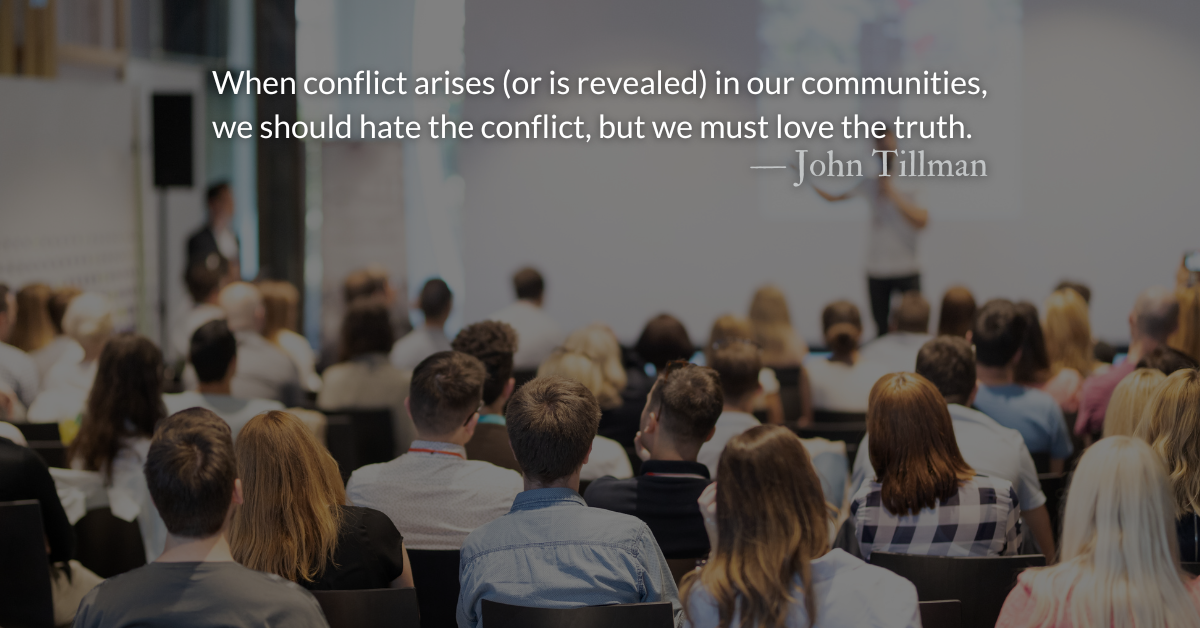Scripture Focus: Proverbs 6.12-19
12 A troublemaker and a villain,
who goes about with a corrupt mouth,
13 who winks maliciously with his eye,
signals with his feet
and motions with his fingers,
14 who plots evil with deceit in his heart—
he always stirs up conflict.
15 Therefore disaster will overtake him in an instant;
he will suddenly be destroyed—without remedy.
16 There are six things the Lord hates,
seven that are detestable to him:
17 haughty eyes,
a lying tongue,
hands that shed innocent blood,
18 a heart that devises wicked schemes,
feet that are quick to rush into evil,
19 a false witness who pours out lies
and a person who stirs up conflict in the community.
Reflection: Hate Conflict? Love Truth
By John Tillman
Many people today are conflict-averse or conflict-avoidant. We cringe when things get tense or walk away, surrender, or stay silent to prevent a conflict. Conflict in a community is horrible, especially within a church community. Division within the church is a division in the body of Christ. It divides what God has united together.
The Lord “hates” a person who stirs up conflict in the community. We are right to mourn division and to hate conflict. When we do, we join our feelings and actions to God’s feelings and actions.
While we mourn division and conflict, we must honestly assess what has happened. What causes division? Who is responsible for stirring up conflict? In Proverbs 6.12-19, it is clear that the deceitful man stirs up the conflict. The deceitful man (or woman) normalizes conflict, conceals conflict, and stigmatizes dissent.
Ahab called Elijah the “troubler” of Israel for stirring up conflict. But Ahab started the trouble and initiated the conflict when he abandoned the Lord and replaced true worship with false worship. (1 Kings 18.16-18) Elijah was labeled a troublemaker when he refused to follow the new normal and exposed Ahab’s false god.
Conflict that is concealed, like sexual abuse or abusive leadership, weaves an illusive false peace. When revelations of truth shatter this false peace, deceitful people often call truth-tellers “troublemakers” and blame them for “stirring up conflict.” It is not unusual for community members to be pulled into this argument, defending the deceivers and abusers and attacking the truth-tellers and victims.
When conflict arises (or is revealed) in our communities, we should hate the conflict, but we must love the truth. Quelling conflict must never come at the cost of the truth. The person the Lord hates is the villain, not the victim.
Beware of corrupt mouths (v12), deceitful hearts (v14), haughty eyes (v17), lying tongues (v17), hands that harm the innocent (v17), and hearts that devise wicked schemes (v18). They will try to convince us to defend them instead of listening to those who speak the truth about them
Not all conflicts are worth having, but we cannot remain conflict-averse or avoidant when victims need our help. We must learn to love the truth more than we love living in a false peace built by deceptive, manipulative leaders.
Revealing the truth is not stirring up conflict. It is the first step toward healing conflict.
Divine Hours Prayer: The Refrain for the Morning Lessons
Let not those who hope in you be put to shame through me, Lord God of hosts; let not those who seek you be disgraced because of me. — Psalm 69.7
– From The Divine Hours: Prayers for Summertime by Phyllis Tickle.
Today’s Readings
Proverbs 6 (Listen 3:22)
Psalm 36 (Listen 1:29)
Read more about Ahab and David
Rather than the friendly relationship David had with God and his prophets, Ahab considers Elijah his “enemy.”
Read more about Prophets in Our Path
When an inconvenient prophecy stops us in our tracks…When an ugly truth comes to light…Let us repent.






